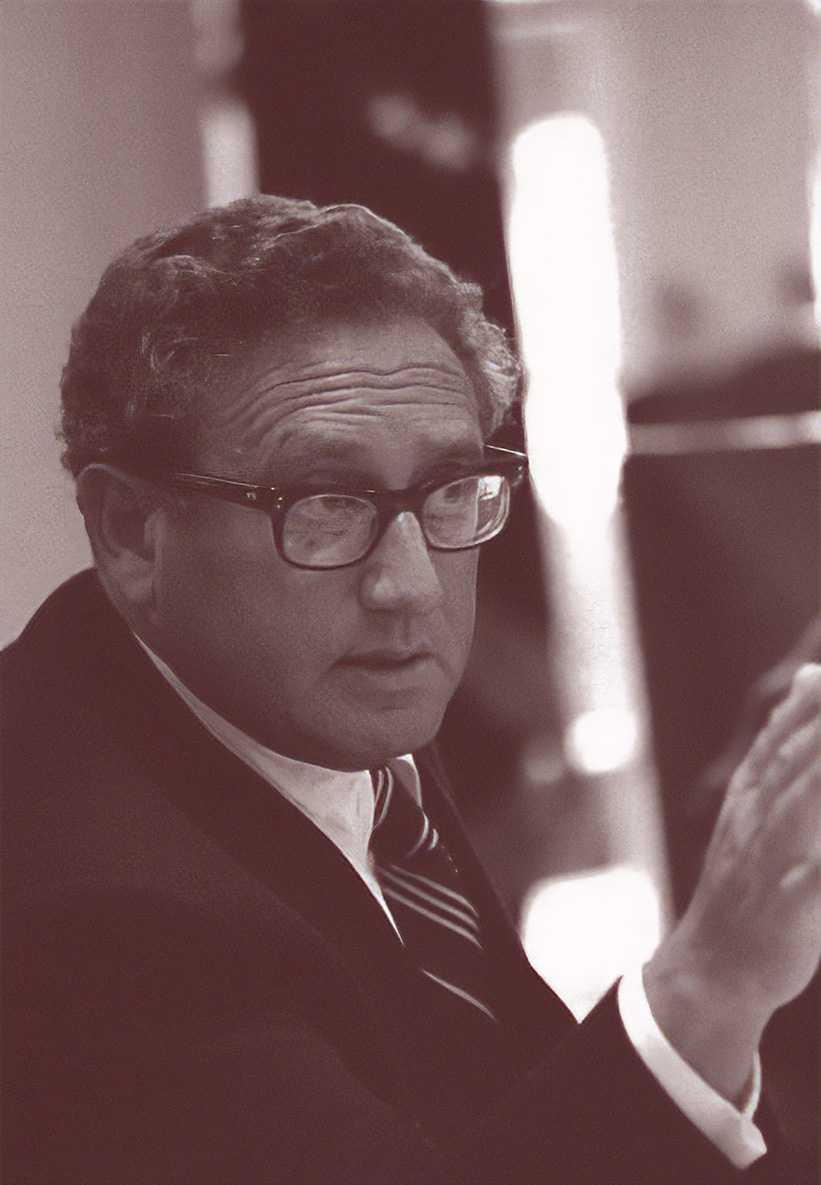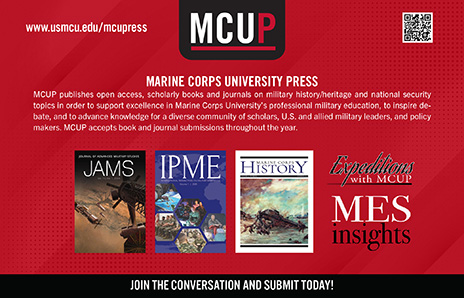Controlling Kissinger
A control officer reflects on his experience with the former Secretary of State and their time in Berlin.
BY FLETCHER M. BURTON

To my generation of Foreign Service officers, Henry Kissinger was an intimidating figure, some combination of Metternich, Machiavelli, and Mephistopheles. My chance to take the measure of the man came in the last week of March 2000, when he traveled to Berlin on one of his periodic visits to take the German pulse. Kissinger was then 76. Some 30 years his junior, I was a mid-level diplomat at the U.S. embassy. The plum assignment to serve as his control officer fell my way—a designation grandiose in any circumstance and especially so with the former Secretary of State. Yet I wondered if the plum was really a sour apple.
Kissinger was intrigued by the shape-shifting city. United but not unified, like the country itself, Berlin had by then reclaimed the seat of the German government. Kissinger knew its past, its complexity, its significance through history. The city was as multifaceted as was Kissinger himself. As a statesman, historian, and native German, he wanted to plumb its many dimensions. He was keen to explore.
For several days I accompanied Kissinger as he made the rounds in Berlin. A control officer does not have the authority of, say, a jockey over a horse; I was more of a stable-hand, helping the real rider into the saddle. There was, however, considerable interest for me in the time in between, especially during long talks in the car or back at his hotel near the Brandenburg Gate. Kissinger spoke openly of his impressions of Berlin as a city, the leadership style of Germans and Americans, his memories of Germany as a boy in Fürth and as an American GI in Hannover, and his own approach to writing history.
Statesman as Cityman
Berlin fascinated Kissinger. He wanted to know about all its varied aspects: the reconstruction of the kaiser’s palace (now the Humboldt Forum), the remnants of the Berlin Wall, the location of the chancellor’s residence, and the Norman Foster design of the Reichstag dome. When we passed the Holocaust Memorial next to the Brandenburg Gate, he wondered out loud about the political effect in Germany of building “a monument to its shame in the heart of the capital,” as he put it. When we passed a theater, he asked if plays of Bertolt Brecht were still staged with their “mordant view of human nature.”
His inquisitive attitude manifested itself as a series of quizzes: Did I know if Daniel Barenboim was still conducting at one of the opera houses? (He was.) Who was up, who was down, in the German Foreign Office? (I could speculate, for that was my beat.) And could I identify the near-identical churches, known as the German and the French, on Gendarme Square? (I made a lucky guess.)
We discussed the dramatic changes that had swept across the city. I recalled my summer internship at the U.S. mission in Berlin in 1987, when, as I told him, I had drawn on his memoirs, using some of his same language on Berlin’s special status in my own reports. “Oh really?” he said. “Probably the first time the State Department had read it.”
A control officer does not have the authority of, say, a jockey over a horse; I was more of a stable-hand, helping the real rider into the saddle.
Leadership Comparisons
He was particularly interested in the varying styles of German leaders. We discussed Churchill’s sardonic put-down of Kaiser Wilhelm, who strutted around desperately hoping to be taken for another Napoleon or Frederick the Great. Churchill got it right, Kissinger said, adding that Kaiser Wilhelm was a miscast figure who marched into a war he did not want.
Our talk turned to Chancellor Adenauer, whom Kissinger admired, in part because of the old chancellor’s judgment (directed at Franz Josef Strauss, the Bavarian paladin) that “one should never confuse energy with strength.”
He told of a memorable episode with Adenauer: The two had once had a conversation in which they concluded that the breach between the Soviet Union and China was widening. When Adenauer later made this same point to President John F. Kennedy, adding that “your own adviser Kissinger agrees with me,” JFK expressed his displeasure that his own adviser was not sharing his insights with him. Kissinger told the story without the consternation he must have felt at the time—and with a bit of satisfaction that, after all, the insight had been correct.
He called JFK “charismatic but superficial,” adding that “Nixon was better equipped but then obsessed with Kennedy.” For Kissinger and me—indeed, for all Americans then in Berlin—Kennedy remained a presence, almost spiritual, because of his passionate expression of solidarity with the city.
Recalling my earlier days as a student at Bonn University, I mentioned a remark by Adenauer that I remembered every time I glanced at the Rhine. The difference between European and American civilization, Adenauer once said, can be traced back to their river systems: The rivers of Europe flow south to north, bringing civilized habits with them; in contrast, the rivers in the U.S. flow north to south, without the same nourishing effect. Kissinger was intrigued by the geographical principle but did not accept its universal validity. Instead, we agreed, Adenauer’s remark said more about him—as a Catholic soul with a Rhenish heart who served as mayor of Cologne and chancellor in Bonn—than about cultural determinants.
As for current German leaders, Chancellor Gerhard Schröder, the Social Democrat, and the up-and-coming Angela Merkel, the Christian Democrat who had just become her party’s head, Kissinger asked the same questions: What was their understanding of history? Their seminal experience? Their generational imprint? What did they know of the U.S.? Did they feel an emotional bond with Americans? Answers to such questions, he believed, offered a window on their psychology, a foundation stone of their politics. In neither case was he sure of the answers. He had come to Berlin for a closer look.

The author at a groundbreaking ceremony for the new U.S. embassy in Berlin in 2004, a few years after the Kissinger visit.
Courtesy of Fletcher Burton
A Generational Divide
Kissinger’s writings make clear that he viewed the return of Germany after World War II to the community of nations as one of the greatest successes of American diplomacy. Now he was troubled, however. A new generation was rising in German politics. Their historical knowledge seemed limited, their political orientation uncertain.
The generational prism was a main lens for Kissinger. Judging by his April 6, 2000, thank you letter to Ambassador John Kornblum, Kissinger was most taken by a small luncheon: “The opportunity for candid discussion with such a group of young leaders was extremely helpful to my understanding of some of the issues and trends that will be dealt with in the coming years. I greatly appreciated the time with them.”
There was always the old guard. At the Adlon Hotel, Kissinger rendezvoused with former Chancellor Helmut Kohl. Kissinger was also eager to see his old friend, Gräfin von Dönhoff, a wonderfully cultivated German from an earlier cultural epoch, a woman who was, as I knew from her memoir and mentioned to her in the Adlon lobby, only two degrees of separation (or, as the Germans say, two handshakes) from Wolfgang von Goethe.
Kissinger and I reminisced about his hometown of Fürth, which I had once visited by bicycle, riding around looking for Kissinger’s boyhood home. He recalled his return to his native Germany during World War II, this time wearing the uniform of the U.S. Army. He related one of his assignments, sitting outside an office and trying to detect former Gestapo types solely by their appearance, commenting that it was a bit preposterous.
Kant and Spengler
At one street corner, he spotted a poster announcing the Ninth Congress on the German philosopher of the Enlightenment Immanuel Kant, a conclave that overlapped with his own visit in Berlin. That brought a gleam to his eye. “Kant!” he said, “I once did a paper on him …” trailing off to allow for, even invite, a follow-up question. That was his senior thesis at college. Kissinger told me Kant took his symbolic logic too far, but he clearly felt an intellectual sympathy with Kant, and there was palpable pride in his long-ago thesis.
In fact, I had heard of his senior thesis while I was in college, not because of its treatment of Kant but of Spengler, who was the subject of my own paper. Kissinger was surprised that I knew of the unpublished manuscript. I said that Spengler’s Decline of the West had riveted me, both its method of universal cultural comparisons and its doomsday prophetic tone. Spengler, Kissinger said, offered a new way of thinking about cultures that he had never encountered before. And in Spengler’s lesser-known work, Prussianism and Socialism, Kissinger contended, he was right in predicting what actually happened in the 1930s in Germany.
Kissinger’s writings make clear that he viewed the return of Germany after World War II to the community of nations as one of the greatest successes of American diplomacy. Now he was troubled, however.
Reasons of State
I brought up Kissinger’s recent work, Diplomacy. When it first came out, in 1994, I was working in the State Department and, at the morning meeting of office directors in the European bureau, read out the book’s dedication: “To the men and women of the Foreign Service of the United States of America, whose professionalism and dedication sustain American diplomacy.” Kissinger was pleased with the book’s reception as well as with the German translation of its title, Staatsvernunft. “That’s a good title in German,” he said, one that suggested raison d’état above and beyond diplomacy.
I asked when he found time to write. “Mostly on weekends,” he said, in longhand on a yellow legal pad. “I’m obsessive about it.” And did he feel, when he finished a book, that sense of relief but also emptiness, the melancholy that comes with saying farewell to a long-term companion that Edward Gibbon noted after completion of his volumes on the Roman Empire? “There is a void,” he said.
Kissinger had brought along copies of his latest book, the third volume of his memoirs, Years of Renewal, as gifts for his German hosts. I asked about the last section, “A Personal Note,” in which he wrote about his grandfather’s words of wisdom, conveyed in German: “Der Mensch muss seine Schuldigkeit tun [A human being must always fulfill his moral obligation].” I said, “Schuldigkeit is an old-fashioned term, not heard often anymore; it’s really a form of virtue.” Kissinger agreed, “It’s all about virtue.” I wondered if the principle had also guided his Staatsvernunft.
One of the last events of his visit was a television interview. His hotel suite was transformed into a studio with lights and cameras. Kissinger pushed to find out what questions might arise, though he was not worried about one particular area. “It’s fine if they ask about Vietnam. I can handle myself on Vietnam,” he said, like a hardened litigator.
Baby Chickens and Crayfish
On the evening of March 30, the American Academy in Berlin, of which Kissinger was a founder, hosted a dinner in his honor. The back of its menu (entrée: crepinet of baby chickens and crayfish with Swiss chard and saffron noodles) served as my notetaking paper for his speech at the event. I recorded themes clustering around statesmanship: the importance of a “sense of direction and national interest” derived from a study of history; examples of both great leadership (President Harry S Truman after WWII) and inept (Kaiser Wilhelm before WWI); and the need for gradualism rather than absolutism in diplomacy. He concluded his remarks on a clarion note, a reference to his revered Kant and the philosopher’s prophecy that “eternal peace” would come from either catastrophe or insight.
As he finished his extensive program in Berlin, Kissinger was keen to return to New York, judging by an overheard phone call to his wife and their discussion of what she would serve him upon his return (scrambled eggs). For me, the assignment had not been a rotten plum after all. The sour apple was handed to his shotgun-riding security aide, a young man on his first overseas outing with a very demanding boss. Kissinger taunted him and, behind his back, ridiculed him. It left me shaking my head. It was the Kissinger sometimes spoken of in State Department corridors, brusque with subordinates, less than generous in spirit. Insistent. Controlling. He was uncannily like the layered, prodigious metropolis he had just explored.
When sharing or linking to FSJ articles online, which we welcome and encourage, please be sure to cite the magazine (The Foreign Service Journal) and the month and year of publication. Please check the permissions page for further details.
Read More...
- “Sage Counsel, Fondly Remembered” by Fletcher M. Burton, The Foreign Service Journal, September 2014
- “Uncovering the Lessons of Vietnam” by Stephen Randolph, The Foreign Service Journal, July-August 2015
- “In Conversation with Henry Kissinger,” World Economic Forum, May 2023




